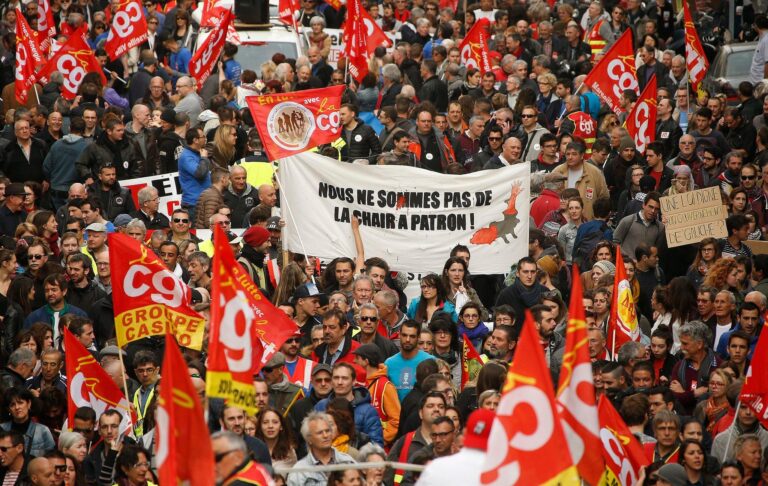Workers across France have launched widespread strikes in response to proposed government budget cuts, escalating tensions between labor groups and authorities. The industrial actions, which have disrupted transport services, public utilities, and various sectors, reflect deepening concerns over the impact of austerity measures on employment and social welfare. This nationwide protest underscores the growing unrest as unions mobilize to challenge fiscal policies they argue threaten workers’ rights and economic stability.
Workers Mobilize Nationwide in Protest Against Government Budget Cuts
Across France, tens of thousands of workers have taken to the streets in a coordinated effort to oppose the government’s recent proposals for significant budget reductions. Trade unions representing public sector employees, transportation staff, and educators called for a nationwide strike that has led to widespread disruption in daily services. Protesters are demanding the reversal of planned cuts which they argue would severely impact social welfare programs and public employment stability.
The movement shows a rare unified front as various sectors present a list of core concerns including:
- Reduction in healthcare funding jeopardizing patient care quality.
- Cutbacks in education budgets threatening teacher jobs and classroom resources.
- Decline in public transportation investment affecting commuter accessibility.
| Sector | Impact of Cuts | Estimated Affected Workers |
|---|---|---|
| Healthcare | Staff layoffs, service delays | 80,000 |
| Education | Resource shortages, larger class sizes | 65,000 |
| Transportation | Reduced routes, maintenance deferrals | 40,000 |
Impact of Strikes on Public Services and Daily Life Across France
Across urban centers and rural communities alike, the recent strikes have disrupted essential public services, leaving millions grappling with interruptions. Public transportation, including buses, trams, and trains, has seen significant delays or complete halts, forcing commuters to seek alternative, often costly means to reach their destinations. In addition, hospitals and emergency services are operating with limited staff, intensifying the strain on healthcare facilities already managing high patient volumes. Schools face closures or reduced hours, impacting students and parents who must adjust their daily routines abruptly.
Notable daily inconveniences include:
- Extended waiting times for public transport
- Closed municipal offices and delayed administrative services
- Reduced garbage collection in affected areas
- Interruptions in postal and delivery services
| Service | Normal Operation | Strike Impact |
|---|---|---|
| Public Transport | Run on schedule | 50-70% cancellations |
| Healthcare | Full staff availability | Reduced to emergency care only |
| Waste Management | Daily collections | Biweekly or halted |
| Postal Services | Standard delivery times | Delays up to 5 days |
Union Leaders Demand Revisions and Engage in Negotiations with Authorities
Union leaders nationwide have stepped forward with a unified stance, demanding substantial revisions to the government’s proposed budget cuts, which they argue would severely impact public sector workers. Employing a combination of formal negotiations and public demonstrations, representatives from various unions have outlined their key grievances, emphasizing the need to protect job security, maintain fair wages, and uphold pension benefits. The dialogue with authorities remains tense but ongoing, with union officials pressing for a transparent review process and more inclusive decision-making frameworks.
In recent meetings, union leaders presented a structured proposal highlighting their core demands. Their strategy includes:
- Reinstating cuts to pension schemes to safeguard retiree benefits;
- Ensuring no layoffs in critical public services;
- Obtaining government commitments for phased budget adjustments rather than abrupt changes;
- Creating joint oversight committees for monitoring reform impacts.
| Key Issues | Union Position | Government Response |
|---|---|---|
| Public sector wages | Freeze pay cuts | Review planned but no commitment |
| Pension reforms | Protect existing benefits | Partial adjustments proposed |
| Job security | Guarantee no layoffs | Potential roles to be reviewed |
Both parties acknowledge the complexity of the budgetary situation, yet union leaders stress that any resolution must prioritize workers’ well-being, warning that failure to compromise could trigger intensified industrial action across France.
Policy Recommendations to Address Worker Grievances and Restore Stability
To address the widespread worker grievances and rebuild trust, it is crucial for policymakers to engage in transparent dialogues with labor unions and employee representatives. Implementing progressive budget measures that prioritize essential public services, while protecting workers’ rights, can help ease tensions. Authorities should consider incremental reforms rather than abrupt cuts to minimize disruption. Additionally, establishing independent oversight committees for budget evaluations can ensure accountability and foster confidence among the workforce.
Key strategies for restoring workplace stability include:
- Enhanced communication channels between government bodies and labor groups
- Targeted support programs for sectors most affected by financial constraints
- Flexible work arrangements to stimulate productivity without mass layoffs
- Investment in upskilling and reskilling initiatives to secure long-term employment
| Recommendation | Expected Outcome |
|---|---|
| Regular Labor Dialogues | Improved Trust and Collaboration |
| Gradual Budget Adjustments | Reduced Worker Resistance |
| Oversight Committees | Transparency in Fiscal Policies |
| Upskilling Programs | Stronger Workforce Resilience |
Key Takeaways
As strikes continue to disrupt daily life across France, the government faces mounting pressure to address the concerns of workers opposing its budget cut plans. With negotiations ongoing, the situation remains fluid, and both sides appear committed to defending their positions. The coming days will be crucial in determining whether a resolution can be reached or if the industrial action will escalate further, impacting services and the broader economy. The BBC will continue to monitor developments and provide updates as the story unfolds.




